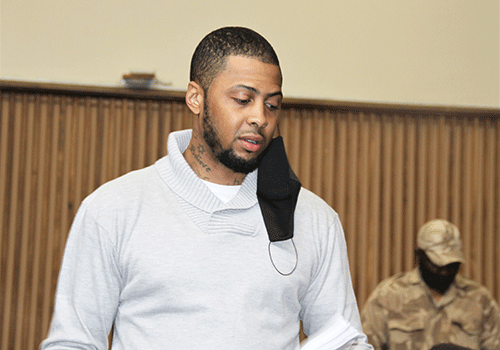A trial-awaiting American citizen has succeeded in a cross-appeal he lodged in the Supreme Court on a buffet of restrictions he has had to bear while at the Windhoek Correctional Facility.
Kevan Townsend, who is on trial for murder and other charges, first lodged an application at the Windhoek High Court together with former magistrate Jaco Kennedy against certain provisions of the Correctional Services Act, resultant practices by the Correctional Services personnel and the police which amount to inhumane and degrading treatment inconsistent with the Namibian Constitution.
They objected to being transported in police vans with their hands handcuffed behind their backs without safety features such as seatbelts; made to appear in court in handcuffs and defined as an offender before conviction.
Both were also denied regular contact visits by friends and family, complained about their prison diet, failure or refusal by prison authorities to afford them adequate facilities to prepare and present their defence, and the conditions of solitary confinement.
While Windhoek High Court Acting Judge Collins Parker upheld some of the complaints, he rejected others.
Not satisfied with the judgment, Townsend lodged a counter-appeal in the Supreme Court after the attorney general lodged an appeal against the whole Parker judgment.
However, the government attorney did
not file their heads of argument and
application for condonation on time and the Supreme Court dismissed the condonation application and struck it from the roll, leaving only Townsend’s cross-appeal to be heard.
In his cross-appeal, Townsend asked the Supreme Court to set aside the High Court’s findings that the word offender is not offensive, finding that the imposition of solitary confinement is not unconstitutional, finding that the right to security of one’s person is not protected under the International Covenant on Civil and Political Rights (ICCPR), and finding that no case was made out for contact visits.
The matter was heard by Judges of Appeal Petrus Damaseb, Elton Hoff, and Acting Judge of Appeal Theo Frank.
Damaseb, who is also the Deputy Chief Justice, wrote the judgment in concurrence with justices Hoff and Frank.
The trio found that there is a stigma attached to the word offender and that it strikes at the heart of the constitutionality guaranteed presumption of innocence to attribute to a person who is only suspected of an offence and is yet to stand trial, a connotation that he or she had already been adjudged guilty.
According to him, the term ‘offender’ is, therefore, inconsistent with Article 12 (1)(d) of the Constitution.
Further, he said, while the Act allows the officer-in-charge of a correctional facility to authorise contact visits to inmates, the blanket non-discretionary adoption by the correctional service of the police’s policy of not allowing contact visits to awaiting-trial inmates is in conflict with Article 12(1)(d) and Article 10 of the constitution.
The judge also found the practice of placing inmates in solitary confinement potentially for as long as 90 days without a chance to present their case or an independent review unconstitutional.
It constitutes arbitrary detention prohibited by Article 11(1) of the supreme law of the land, the judge stated.
Townsend was represented by Uno Katjipuka from Nixon Marcus Public Law Office Pro Amico and the government by Mkhululi Khupe.
Nudes
Inanother matter still to be heard, Townsend and Kennedy also filed a case with the High Court in which they seek to receive conjugal visits and possess partly-naked pictures while in prison.
The Namibian reported earlier this year that Townsend, who is accused of murdering Andrè Heckmair and ex-magistrate Kennedy, accused of raping two women he offered lifts to, filed a case in the Windhoek High Court, complaining that the prison authorities are violating their constitutional right to freedom of expression by not allowing them to receive or possess what they describe as “semi-nude images”.
The court should order the prison authorities “to cease and desist from removing semi-nude images from plaintiffs’ private printed material”, the two men are asking.
Kennedy and Townsend are also claiming that police and prison authorities are unreasonably refusing a request for them to be allowed to receive “conjugal or private family visits”.
A conjugal visit is an appointment (to a prisoner from a husband or wife) in which a married couple is able to have coitus.
The two men are suing the safety and security minister as minister responsible for the police and prisons, the inspector-general of the Namibian Police, the commissioner-general of the Namibian Correctional Service, the officer in charge of the Windhoek Correctional Facility as well as the Ombudsman.


